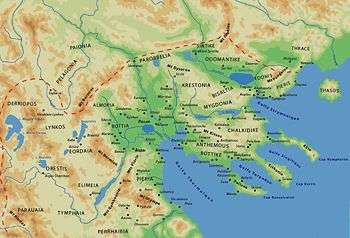Edonis (region)

Edonis or Edonida (Ancient Greek: Ἠδωνίς, Ἠδωνίδα) also transliterated as Edonia, was an ancient region of Thrace which later became a district of Macedon. Its name is derived from the ancient Thracian inhabitants of the region, the Edonians.[1] It bordered Odomantice in the north, Bisaltia in the west with, the Aegean Sea in the south, and was separated from Thrace proper by the river Nestos in the east.
Geography and History
Edonis was stretched from lake Achinos and the mouth of the Strymon river in the west, to Nestos river in the east (natural border between the regions of Macedonia and Thrace).
The region was predominantly settled by the tribe of Edoni. Later, the Greeks settled in the region, drove out the Edonians and built several colonies, including Amphipolis, and Eion.[2] Within its limits was Pangaion, where its mines had been exploited by Philip II after his conquest and the annexation of the region to the kingdom of Macedon. After the Roman conquest, Via Egnatia was passing through Edonis and with the establishment of Philippi as Roman colony (42 BC) most of Edonis became part of its territory (territorium).[3]
Pieris
Thucydides testified that at the foot of Pangaion were established Pierians, who had expelled from their homeland, Pieria, when the Macedonians conquered it. There they built the namesake town Edonian Methoni in contrast to Pierian Methoni and they named the nearby land "Pieris".[4]
Towns
Edonis and especially mount Pangaio was one of the oldest worship places of the gods Apollo, Dionysus and Orpheus. The most important towns of Edonis, except from Methoni, were also:[5][6]
- Amphipolis
- Eion
- Philippi
- Apollonia
- Neapoli
- Pistyros
- Myrkinos
- Oisyme
- Phagres
- Galepsos
- Gazoros
- Drabeskos
- Pergamon
- Domeros
- Antisara
See also
- Resident Evil 6, A fictional Republic of Edonia can be visited in this game.
References
- ↑ D. C. Samsaris, Historical Geography of Eastern Macedonia during the Antiquity (in Greek), Thessaloniki 1976 (Society for Macedonian Studies), p. 95-97
- ↑ The Peloponnesian War (The Landmark Thucydides edition, Robt. B. Strassler, editor), Touchstone, New York, 1998, sec. 1.100 and 4.107, and maps 1.99 and 4.106
- ↑ D. C. Samsaris, Historical Geography of Eastern Macedonia during the Antiquity (in Greek), Thessaloniki 1976 (Society for Macedonian Studies), p. 87-88
- ↑ Thucydides, Book II, 99
- ↑ D. C. Samsaris, Historical Geography of Eastern Macedonia during the Antiquity (in Greek), Thessaloniki 1976 (Society for Macedonian Studies), p. 135-170
- ↑ Benjamin H. Isaac, The Greek Settlements in Thrace Until the Macedonian Conquest, p. 4-69